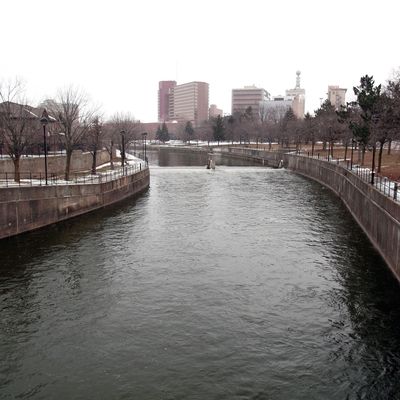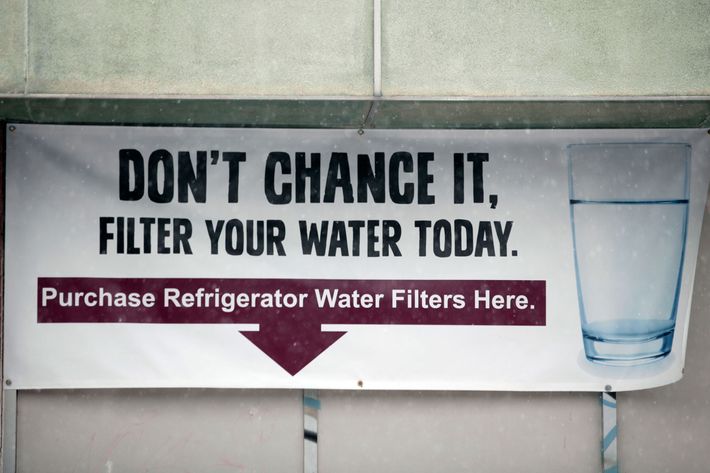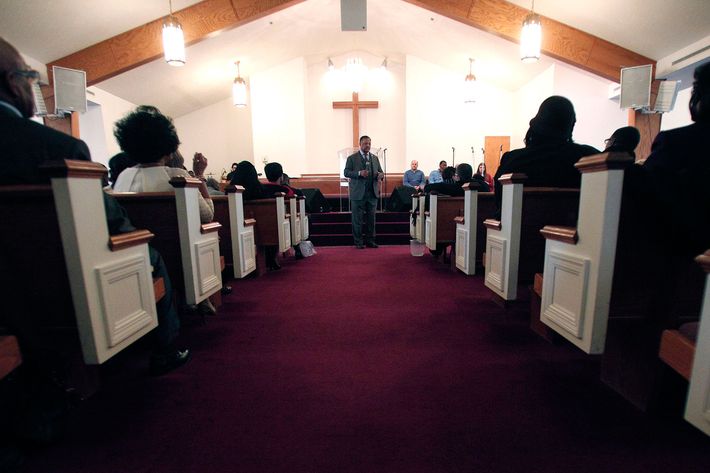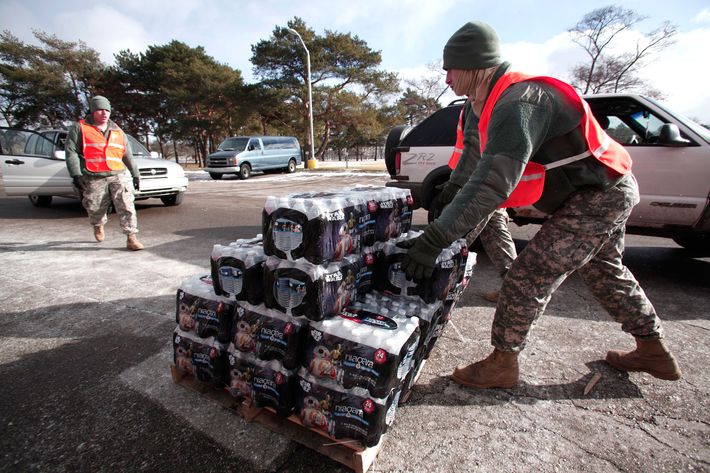
This weekend, President Obama declared a federal emergency in Flint, Michigan, where children are getting poisoned because of the lead-contaminated water coming out of the city’s old pipes. As local politicians try to deal with the disaster, the story has gone national, even making an appearance on the Democratic debate stage this weekend.
Here’s the latest on what’s happening, as President Obama prepares to visit Michigan on Wednesday.
The Governor Admits He Made a Terrible Mistake
The crisis began shortly after the newly appointed emergency city manager of Flint decided to stop taking water from Detroit for cost-saving purposes in 2014. The city, suffering from manufacturing contractions like many other places in the Midwest, had seen its population shrink considerably and was eager to find the few places left in the budget to slash. The city’s water would come from the Flint River instead. Residents complained about how the water smelled bad, and activists told officials that they were worried the water wasn’t safe for ages, but nothing happened until October, when officials acknowledged that children were suffering from the effects of lead poisoning at a higher rate than when the city was using Detroit’s water. Those who had been dealing with the weirdly colored water for months — and getting weird rashes and sicknesses for unexplained reasons — had collected evidence in bottles to show the city’s negligence. Now the budget-slashing has left the city with a problem that will likely cost hundreds of millions of dollars to fix.
Governor Rick Snyder didn’t declare a state emergency until January 5. When Time asked him last week if he waited too long to do so, he said, “There were issues in terms of getting appropriate answers. That was unfortunate. It would’ve been good to have that information sooner. And I am responsible for those people. I don’t deny that.” This week, he seemed more willing to admit that his administration did a bad job when talking to Ron Fournier at National Journal. When asked if it was unfair to call the water crisis his Katrina, Snyder said, “No. It’s a disaster. … It’s clearly a negative on what we’ve accomplished since I’ve been governor. … Trust is something that once you lose it, it’s much harder to earn it back. So that’s the point we’re at.”

Back in July, a state health worker sent an email to her superiors noting dangerous levels of lead in Flint’s water. Nothing happened.
The state’s chief medical executive told NBC News, “Can I look back and say that was a missed opportunity? Absolutely.”
The Michigan Department of Environmental Quality was tasked with making sure the water from Flint River was treated correctly — it wasn’t. As a result, the water was able to easily leach lead from the city’s old pipes.
Snyder adds that he isn’t considering resigning, though several officials have called for him to do so, including Bernie Sanders. The governor will give his State of the State on Tuesday night; unsurprisingly, he will focus mainly on the water crisis. Per MLive:
[He will ask] the legislature for help to implement a “comprehensive action plan for Flint and its residents” that includes continued funding for filters and water and also extended treatment for children who have tested with high levels of lead in their blood. That treatment will include testing, monitoring, nurse visits and other health measures.
He will also have to address the fact that many residents unwilling to pay for the gross water have been threatened with having their water shut off.
A rally is scheduled outside the state capitol on Tuesday for those protesting the governor. The state Republican Party also plans on gathering there, according to the Detroit News, in order to collect water bottles.
Flint’s Mayor Endorses Hillary
On Sunday, each of the Democratic candidates on the debate stage was asked whether there was anything they wanted to address that hadn’t been covered.

Hillary Clinton wanted to talk about the water crisis.
I spent a lot of time last week being outraged by what’s happening in Flint, Michigan, and I think every single American should be outraged. We’ve had a city in the United States of America where the population, which is poor in many ways and majority African-American, has been drinking and bathing in lead-contaminated water. … I’ll tell you what, if the kids in a rich suburb of Detroit had been drinking contaminated water and being bathed in it, there would’ve been action. So I sent my top campaign aide down there to talk to the mayor of Flint, to see what I could do to help. I issued a statement about what we needed to do, and then I went on a TV show and I said it was outrageous that the governor hadn’t acted. And within two hours, he had.
Two days later, she got an endorsement from Flint’s mayor, Karen Weaver, who just started in November. She told reporters, “I want Hillary. She has actually been the only, the only candidate, whether we’re talking Democratic or Republican, to reach out and talk with us about, ‘What can I do? What kind of help do you need?’”
On Monday, Clinton called the crisis a “civil-rights issue.”

On the Republican side of the presidential race, candidates have been far quieter on this issue. According to ThinkProgress, Senator Marco Rubio told reporters, “It’s just not an issue we’ve been quite frankly fully briefed or apprised of in terms of the role the governor has played and the state has played in Michigan on these sorts of issues.” He added that he was unable to give “a deeply detailed answer on what the right approach should be.”
Trump was also unable or unwilling to talk much about Flint when asked.
Obama Heads to Michigan
A day after Snyder gives a speech heavily focused on Flint, President Obama is scheduled to be in Michigan for a quick visit to Detroit to talk about the auto industry. There has been no announcement that he also plans to stop by Flint, but Mayor Weaver was in the White House this week talking to administration officials about the crisis. White House spokesperson Josh Earnest told reporters that he expected the mayor would meet with Obama too. According to the Detroit Free Press, Health and Human Services Assistant Secretary for Preparedness and Response Nicole Lurie has been appointed to deal with the federal response to Flint.
On Monday, EPA head Gina McCarthy said that the agency “did its job,” although “the outcome was not what anyone would have wanted. So we’re going to work with the state, we’re going to work with Flint. We’re going to take care of the problem,” she said.
Flint native Michael Moore set up a petition on his website asking Obama to visit the city.
The city is also grappling with the fact that its terrible water may have led to other problems. MLive reported last week that Flint’s Legionnaires’ disease outbreak in 2014 may have been related to the new water supply.
Besides the health problems, the city might have to deal with a bit of economic backlash, too — something it definitely didn’t need more of. The Detroit News talked to a bunch of restaurant and bar owners, who have mostly found that people are afraid to eat out lately. One owner said, “I tell you what, it’s going to be something like a ghost town. Who wants to drink poison? You want to live in Chernobyl? No. It used to be auto city; now it’s poison city.” Many have been serving bottled water to ease customers’ minds, but that costs money, too.
Last week, Snyder sent the National Guard to Flint to hand out water bottles and water filters.





























